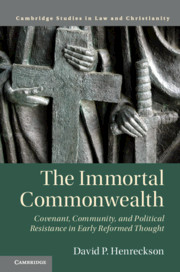2 - The Law of the Covenant
Relations and Norms in the Theological Context
Published online by Cambridge University Press: 24 June 2019
Summary
In early modernity, covenantal language could evoke biblical, theological, contractual, or political themes – often all at once. The boundaries between disciplines and realms of social life, as we will see, were far more porous for early modern theologians, lawyers, and political philosophers than late moderns usually assume. The task of this chapter is to show the distinctive theological shape of covenantal language, with an eye to the political application of covenant around the turn of the seventeenth century. In the sixteenth century, covenantal terms such as pactum, foedus, and testamentum could refer to several species of relationships. I concluded the previous chapter with an outline of what I call the consociational model of covenant. A covenant of this sort refers to a particular sort of fellowship or form of life-sharing in which members participate in some common good through the communication of rights and services.
- Type
- Chapter
- Information
- The Immortal CommonwealthCovenant, Community, and Political Resistance in Early Reformed Thought, pp. 49 - 71Publisher: Cambridge University PressPrint publication year: 2019

